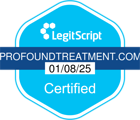Klonopin, or Clonazepam, is a prescription drug that belongs to the class of benzodiazepines, like Xanax or Ativan. Klonopin is typically used to treat anxiety disorders and seizures. It works as a central nervous system (CNS) depressant, and has a sedative and calming effect. Klonopin can be prescribed for legitimate reasons, but due to its effects, it can easily be abused.
Klonopin
SIGNS OF KLONOPIN ABUSE
Addiction is characterized by the compulsion to take more medication than needed, and an inability to stop despite negative consequences. Some of the outward symptoms of Klonopin abuse can be:
- dizziness
- vertigo
- fainting
- numbness
- impaired cognition
- confusion
- slowed reaction time
- impaired judgment
- reduced libido
WITHDRAWAL AND DETOX
Klonopin, and benzodiazepines in general, can be dangerous and even life threatening to withdraw from. It is critical that you detox and withdraw under medical supervision. Some of the symptoms of Klonopin withdrawal are:
- hallucinations
- increased body temperature
- irritability
- trouble with coordination
- trouble sleeping
- nausea and vomiting
- anxiety
- seizures
- sweating
- panic attacks
- coma (severe cases)
Klonopin withdrawal has two phases, acute and post-acute. Acute withdrawal usually lasts between 2-4 weeks with Klonopin. Post-acute withdrawal can last up to 18-24 months.
TREATMENT
Treatment begins with admitting you have a problem. Profound will help craft a treatment plan to suit your unique needs. Typically, with a drug as addictive as Klonopin, medical detox and inpatient treatment are your best options. Profound offers programs for each step of the recovery process, with detox and inpatient services, to LGBTQ+ and Professionals Programs.
Sources:








